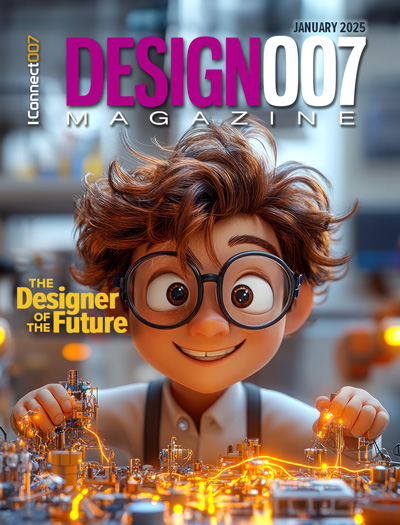-

- News
- Books
Featured Books
- design007 Magazine
Latest Issues
Current Issue
The Designer of the Future
Our expert contributors peer into their crystal balls and offer their thoughts on the designers and design engineers of tomorrow, and what their jobs will look like.

Advanced Packaging and Stackup Design
This month, our expert contributors discuss the impact of advanced packaging on stackup design—from SI and DFM challenges through the variety of material tradeoffs that designers must contend with in HDI and UHDI.

Rules of Thumb
This month, we delve into rules of thumb—which ones work, which ones should be avoided. Rules of thumb are everywhere, but there may be hundreds of rules of thumb for PCB design. How do we separate the wheat from the chaff, so to speak?
- Articles
- Columns
Search Console
- Links
- Media kit
||| MENU - design007 Magazine
Beyond Design: Mastering “Black Magic” with Howard Johnson’s Seminars
July 25, 2016 | Barry Olney, In-Circuit Design Pty LtdEstimated reading time: 2 minutes
Dr. Howard Johnson, the world’s foremost authority on signal integrity, has recently released his High-Speed Digital Design (HSDD) Collection. This includes professionally recorded seminars that he presented, for more than 20 years, at Oxford University and worldwide and is arguably the most practical and enlightening course on high-speed—black magic—ever delivered. Howard’s unique explicatory presentation style creates an unforgettable picture of signal propagation by practical example. If you want to gain some of his enthusiasm and master the art of high-speed design, then the collection is a must-have.
I recently had the opportunity to review all three of the seminars in this collection, a total of 36 hours of viewing time. When presented with a selection of three seminars, to watch, I guess it is only natural to want to start with the more advanced topic. But I am glad that I forced myself to start at the beginning to refresh the basics before moving on to the more complex issues. It is amazing how much I either did not know or had simply forgotten over the years. Or maybe I’ve just killed too many brain cells along the way!
I know that during my own courses, there is always one guy at the back who falls asleep. And strangely enough, he is always the one to give bad feedback, probably because he didn’t learn anything. But I guarantee that you will be on the edge of your seat throughout Howard’s entire seminar series. His dynamic teaching style ensures you feel like you are not just a part of the audience—you are actually participating in the demonstrations. The picture that Howard paints leaves a lasting impression on how electromagnetic fields propagate and how they induce voltages and current (crosstalk) into nearby signals. The following is a section-by-section discussion of the course contents.
1. High-Speed Digital Design
Engineers and PCB designers need to understand electromagnetic theory, appreciate how coupling occurs and why energy moves to unintended, sensitive parts of the circuits. A logic schematic diagram masks details crucial to the operation of unintentional signal pathways vital to your understanding of signal performance, crosstalk and EMI. To realize these factors, one must uncover the hidden schematic, operating behind the logic diagram, to reveal the parasitic elements that affect the circuit. These parasitics are invisible to the uninitiated, but become very clear once skillfully explained in detail. You will gain new insight into what really happens in the circuitry.
Also, understanding the frequency band that really matters for digital design is very important. Traditionally, we used 0.35/Tr (where Tr is the rise time in ps) for the upper bandwidth. However, Howard recommends using an upper knee frequency of 0.5/Tr, which forms a crude, but useful, translation between time and frequency domains. So for instance, if the rise time is 500ps, which is typical these days, then the upper bandwidth is actually 1GHz regardless of the clock frequency. Furthermore, the constant improvement in the IC process reduces die size which speeds-up the rising edge. This in turn pushes the knee frequency up, causing signal overshooting and ringing.
To read this entire article, which appeared in the June 2016 issue of The PCB Design Magazine, click here.
Suggested Items
Intervala Hosts Employee Car and Motorcycle Show, Benefit Nonprofits
08/27/2024 | IntervalaIntervala hosted an employee car and motorcycle show, aptly named the Vala-Cruise and it was a roaring success! Employees had the chance to show off their prized wheels, and it was incredible to see the variety and passion on display.
KIC Honored with IPC Recognition for 25 Years of Membership and Contributions to Electronics Manufacturing Industry
06/24/2024 | KICKIC, a renowned pioneer in thermal process and temperature measurement solutions for electronics manufacturing, is proud to announce that it has been recognized by IPC for 25 years of membership and significant contributions to electronics manufacturing.
Boeing Starliner Spacecraft Completes Successful Crewed Docking with International Space Station
06/07/2024 | BoeingNASA astronauts Barry "Butch" Wilmore and Sunita "Suni" Williams successfully docked Boeing's Starliner spacecraft to the International Space Station (ISS), about 26 hours after launching from Cape Canaveral Space Force Station.
KIC’s Miles Moreau to Present Profiling Basics and Best Practices at SMTA Wisconsin Chapter PCBA Profile Workshop
01/25/2024 | KICKIC, a renowned pioneer in thermal process and temperature measurement solutions for electronics manufacturing, announces that Miles Moreau, General Manager, will be a featured speaker at the SMTA Wisconsin Chapter In-Person PCBA Profile Workshop.
The Drive Toward UHDI and Substrates
09/20/2023 | I-Connect007 Editorial TeamPanasonic’s Darren Hitchcock spoke with the I-Connect007 Editorial Team on the complexities of moving toward ultra HDI manufacturing. As we learn in this conversation, the number of shifting constraints relative to traditional PCB fabrication is quite large and can sometimes conflict with each other.


